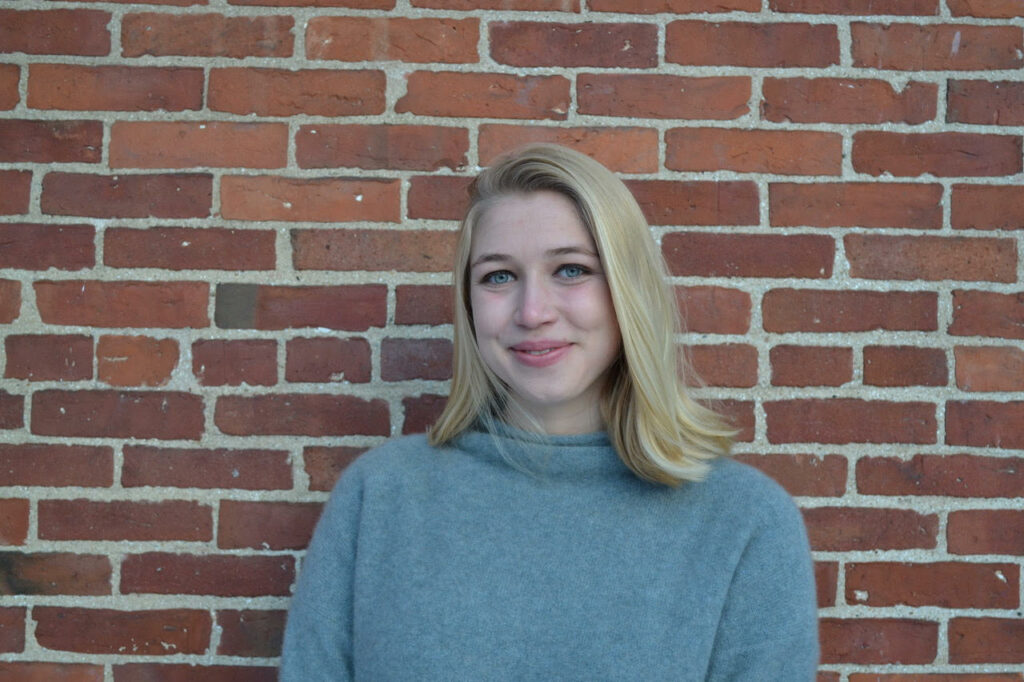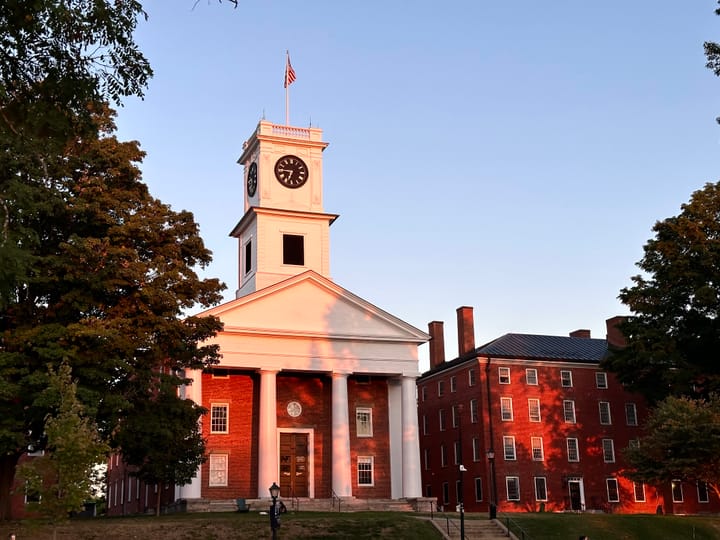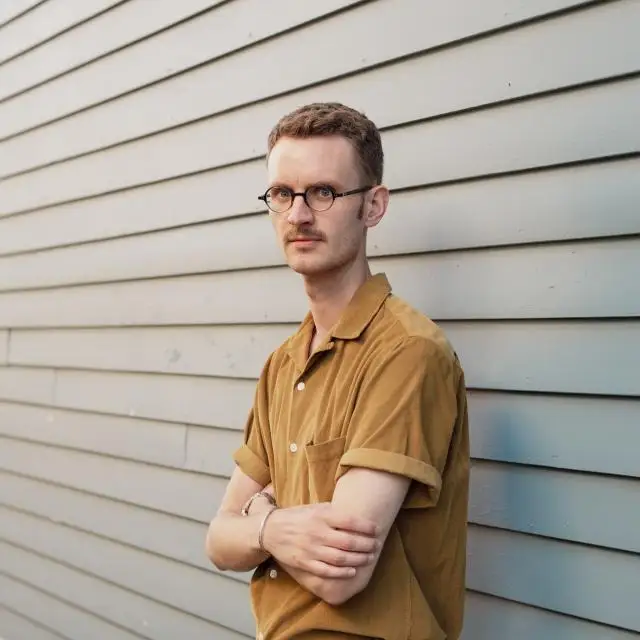Olivia Gieger: The Activist Behind the Byline
From the outside, Gieger’s path seems to decouple into two distinct threads: activism and journalism. But talking to Gieger, it becomes clear that, for her, those parallel interests are inextricably connected.


“This is the only way I know how to talk,” admits Olivia Gieger ’21 after we both realize our conversation has unknowingly been going for almost two hours. It is 85ºF in Amherst, Massachusetts and Gieger is sitting across from me at a Valentine Quad table, with wisps of blonde hair framing her face, which is rosy from the heat.
Foolishly, I had arrived to the interview with a couple of pages worth of questions even though, of course, no conversation with Gieger can be contained to the standard Q&A format. She is the best kind of interview in that she makes you forget you are in one.
When I joined The Amherst Student during my sophomore fall, I already knew of Gieger, even though I didn’t quite know her yet. We had crossed paths in a couple of other club meetings and she frequented similar study spaces in Frost — the Amherst way to get to know someone from afar. Working on the newspaper team, I finally got the opportunity to cut the distance. I watched her take the helm of The Student and lead the publication through the storm that was 2020. Even amid arguably the most trying circumstances of recent Amherst College history, Gieger was constantly interrogating how the newspaper could better serve its community.
Perhaps Gieger will not realize the impact she has had on me until she reads this profile. As a rookie student journalist, I have been hesitant to acknowledge my passion for the field — it’s a difficult path to choose, especially in a time when journalism seems to reckon with a new existential crisis each year. But in Gieger, I see someone who approaches the things she loves without reservation. She was proud to be in the newsroom (or, later on, the news-Zoom) on Tuesday evenings. She took the work seriously and made you feel like your role on The Student truly meant something. Her pride for and dedication to journalism assured me, for the first time, that this path did not have to be a pipe dream. She does not second-guess her interests, even and especially when those interests lead to uncertain places. Instead, when she finds something that sets her mind on fire, she simply leans into the blaze.
The Right Kind of Stubborn
The natural question, then, is what ignited Gieger’s first flame? The answer involves a dispute with her mom. During Gieger’s early years of middle school in Wellesley, Massachusetts, her mother had decided to cut down some trees in their backyard. With the initial seeds of environmental consciousness having already been planted in her brain, suddenly, fifth-grade Gieger had a cause. “I was very stubborn and impassioned as a small child, and I think that for some reason, I was like, ‘This is a plucky fight that I can take up.’”
From there, she joined her middle school’s Green Team and learned more about environmental activism. On the Green Team, Gieger wrote an article about what can and cannot be recycled at her middle school, which was published in “The Locker,” the school-wide newspaper. The editors on that newspaper urged her to join as an official editor. With this first entrance into journalism, one might expect the story to follow the classic love-at-first-sight trope.
But interestingly, once she joined “The Locker,” Gieger “really hated it.” Still, even as a middle schooler, she subconsciously understood the necessity of journalism regardless of the drudgery one must sometimes endure to execute it. By the end of her tenure at The Locker, Gieger was one of the only committed staff members — but she would not quit. “I was like, if I’m not going to do it, then who’s going to do it?”
At Wellesley High School, Gieger would go on to take formal journalism classes where she would realize, “Oh, I actually really like this and I might even like this more than I like the activism stuff.” She graduated from The Locker to Wellesley High School’s Bradford Student Newspaper where she eventually became editor-in-chief. But even as she fell harder for journalism, she never left activism behind.
In fact, the fifth-grader who would not let her mom cut down the backyard trees would soon become one of a couple high schoolers in a courtroom, suing (and ultimately winning against) the Department of Environmental Protections for negligence on climate change policy. Her childhood stubbornness had evolved into a steadfast intuition for what is right — which would go on to fuel things much deeper than mother-daughter quibbles.

Unglamorous Moments at the Helm
From the outside, Gieger’s path seems to decouple into two distinct threads: activism and journalism. But talking to Gieger, it becomes clear that, for her, those parallel interests are inextricably connected. “Over time, I’ve come to really strongly believe in the power of journalism to have a political and activist force.” As an English and environmental studies major, Gieger likes to reside at the intersection of journalism and activism, and it is that niche which has characterized her time at Amherst.
But the work of both of these fields is notoriously difficult and can often require high amounts of behind-the-scenes work with little recognition to compensate. Still, Gieger knows the work of journalism and activism is essential, even in the unglamorous moments. As editor-in-chief of The Student during a pandemic and a nationwide reckoning with racial injustice (plus episodes of blatant racism on our own Amherst campus), Gieger encountered a slew of those unglamorous moments.
When news broke about a hate crime committed by members of the men’s lacrosse team in March 2020, The Student got into full gear trying to ethically and effectively cover it. Then, just a couple of days later, Amherst College notified students that they would have to clear their dorms and move out due to the escalating severity of the coronavirus. “I’ve never felt so close to my actual wit’s end,” Gieger recalls. The journalist and activist knew that even amid the chaos spurred by the coronavirus, it was imperative that the racial culture that caused harm to Black students on campus not be forgotten. In the face of these sort of obstacles, Natalie De Rosa, her co-editor-in-chief, describes, “Olivia is more like, ‘How are we going to fix this, I want to make things right.’ And she’s very forward with that in ways that I am never brave enough to be, and that’s something that I will always take with me and will always be inspired by.”
So even as she anxiously attempted to defeat the coronavirus by wiping down every corner of her dorm room with Lysol, her duty as a leader of The Student was still at the fore of her mind. With the backlash resulting from the men’s lacrosse team hate crime now forced to take place remotely, Gieger recognized that The Student could act as the forum students needed to process the harm and demand change.
“This was a time when our whole campus was disparate and there was no shared meeting grounds — like quad-equivalent area — and I think that The Student was able to be that communal space,” Gieger explained. The racist incident with the lacrosse team incited a slew of remote activism. The Black Student Union published #IntegrateAmherst, an op-ed series in The Student that interrogated the college’s racial history and laid the contextual groundwork for later movements like Reclaim Amherst to put forth concrete demands for the college administration. The Student’s editorial board also did its own self-reflection, led by Gieger and De Rosa, reformulating the newspaper’s mission statement to examine how this newsroom has contributed to the institutionalized inequity of the college.
Absorbing Life “In The Most Saturated Way”
Throughout all of the tough executive decisions and journalistic dilemmas, there were also glimmers of hope and accomplishment. It is easy enough to list off Gieger’s resume and feel impressed. However, the moments that Gieger reflect on as true successes cannot be summed up by a C.V. bullet point. Instead, Gieger’s victories are found in the experiences that helped her discover her values and bring her closer to understanding what her place in the world of journalism could be.
During her sophomore summer, as an intern at Forbes, Gieger learned not only the daily work life of a journalist, but also, under the guidance of her mentor, Anne Glusker, found ways to absorb the full energy of New York City. Glusker took her to plays and restaurants, encouraging her to experience the city in its complete pre-Covid glory. “It was awesome to do something that you cared about and do something that you loved and write about things that felt important and then also just soak in the world in the most saturated way,” Gieger reminisced.
In college, Gieger followed in her middle-school self’s footsteps by making large contributions to environmental activism on campus. Megaphone in hand, Gieger helped lead an October 2019 rally to put pressure on the administration to execute the Climate Action Plan, which commits the college to climate neutrality by 2030. But despite her common interests with her childhood self, Gieger “would like to think that — even though I am still very much environment-centric — I’m a lot more broad in my activism and that my concerns for the world are not just environmental now.”
Exploring the intersection of her environmental concerns and other interests is what eventually led Gieger to pursue a thesis in the English department. Her paper, titled “Rethinking Rupture,” was advised by Professor of English Anna Abramson, who also attended Wellesley High School, coincidentally enough. Through her thesis, Gieger investigated the conventional narratives about the nature around us through the lens of three different works of literature. Completing a thesis is difficult in a normal year, but it is especially tough when thesis meetings and research are forced to take place remotely. Luckily, Abramson and Gieger were living in relatively close proximity during the fall of 2020. They were even able to have several thesis meetings in person in Abramson’s backyard. “We sat in these red beach chairs I pulled out of the garage,” Abramson recalls, “The fall leaves were scattered all over the yard, we were wearing masks, the pandemic was still raging globally — and yet there we were, doing the intellectual work of crafting a thesis. It was surreal and different and utterly memorable; I don’t think I’ll ever forget that.”
A View from Somewhere
Part of the reason it is so easy to lose track of time in a conversation with Gieger is that, over the years, she has developed a perspective that is hard to come by at a place like Amherst.
It can often feel like this campus is designed around next steps. We choose our courses, our living spaces and our jobs before we’ve even had a chance to finish the current ones. Sometimes, it feels that we’re all being propelled along a preset trajectory with a right and wrong direction.
But in the middle of our conversation, Gieger gave me a book recommendation, which I took a quick moment to scribble down. It is “The View From Somewhere” by Lewis Raven Wallace. It investigates the journalistic ideal of objectivity that has governed the industry for so long — the idea that a journalist’s perspective should be so impartial that it is equivalent to a “view from nowhere.” Wallace instead posits that human subjectivity is inevitable and instead of industry-wide denial, journalists should recognize their “view from somewhere” as an inseparable part of their storytelling.
Gieger’s approach to life feels distinctly influenced by this idea: Rather than follow what some may see as the objectively right path, she takes time to immerse herself in experiences that give her a better understanding of her own perspective — and how that perspective influences how she tells stories. Wherever she goes next, I know I will continue to look to her as a reminder to never hesitate on the things you love, because for Gieger, the right path is whatever helps cultivate her own “view from somewhere.”





Comments ()